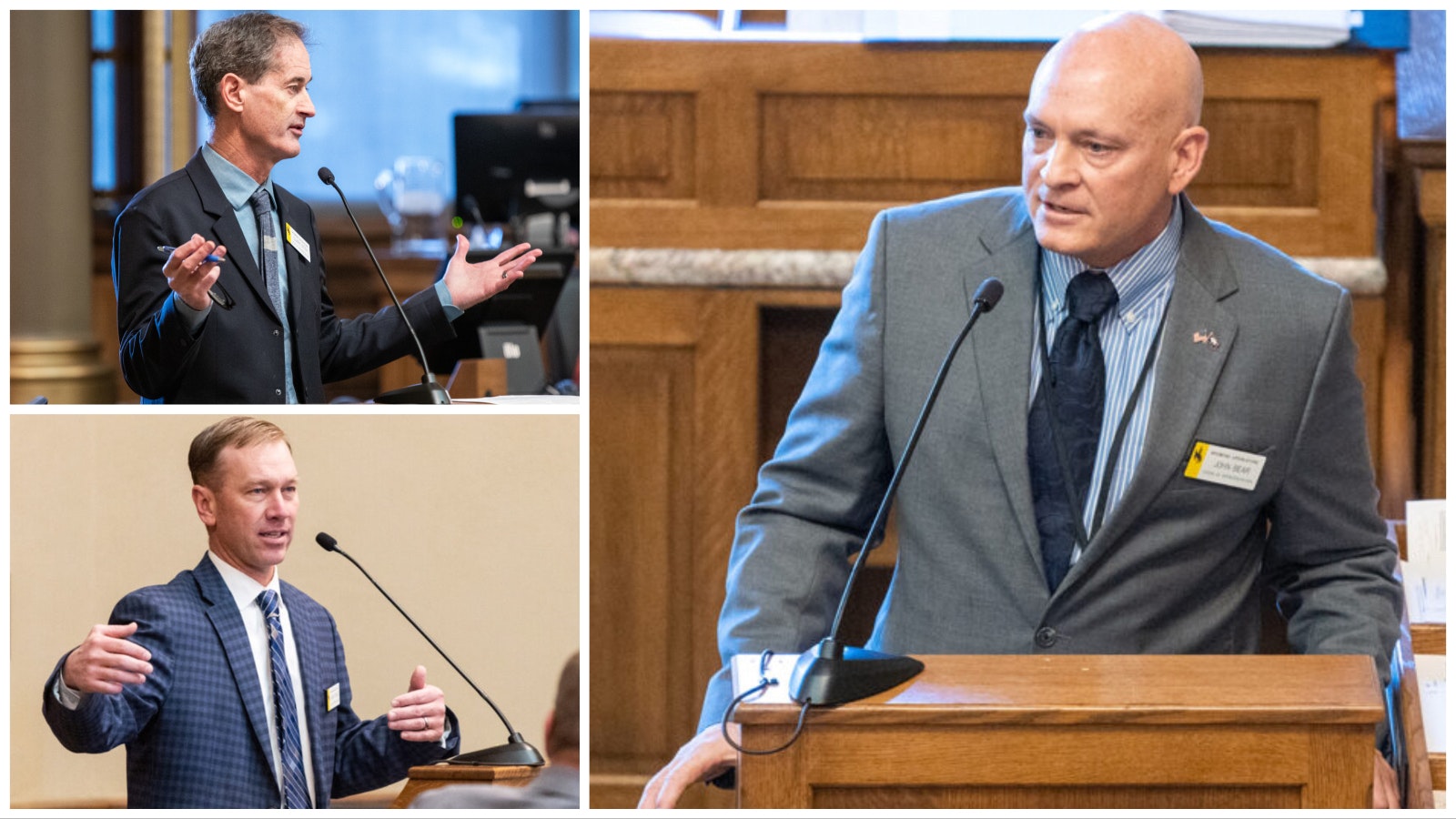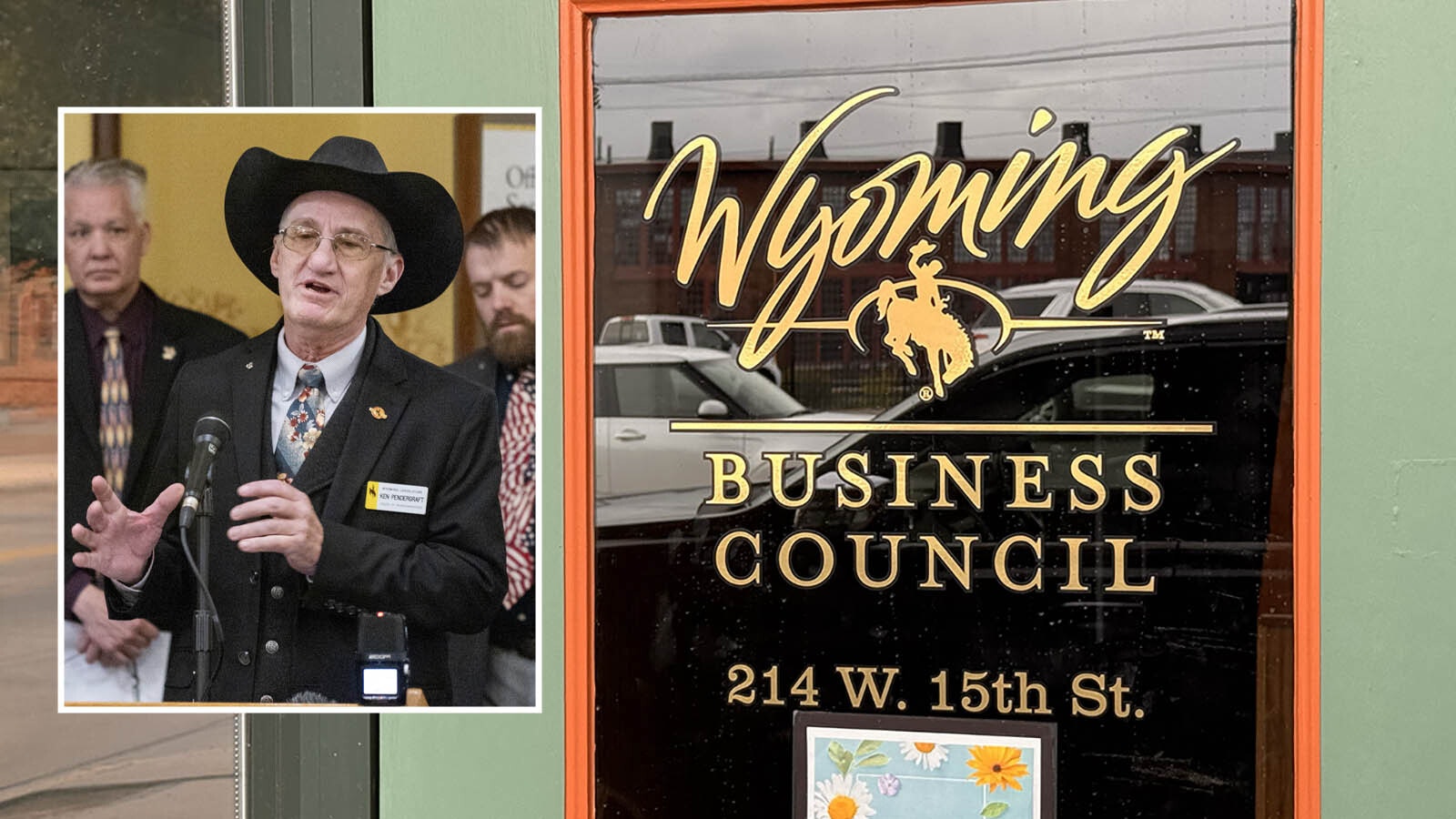There will likely be two organized factions of the Wyoming Republican Party vying for power within the state Legislature.
A group calling itself the “Wyoming Caucus” is starting to take shape, comprised of a number of lawmakers who describe themselves as traditional Republicans, detached from the hardline conservative Wyoming Freedom Caucus, which has grown in numbers and political influence over the past year.
“The Wyoming Caucus is more amendable to arriving at a good solution, which may not be the perfect solution,” said House Speaker Pro Tem Rep. Clark Stith, R-Rock Springs. “The better is the enemy of the good. If we can get something good that gets done, it’s better to do than nothing at all.”
Some of the earliest roots of the new GOP group sprouted from legislative leaders pushing back on claims made by members of the Freedom Caucus in a series of op-ed pieces published in Cowboy State Daily and in press releases.
“There was concern that if Republicans in the middle of the spectrum were to be passive, that the public could get the impression that only the most extreme proposals are worth being called Republican,” Stith said. “There’s a messaging aspect to this.”
From there, Rep. Barry Crago, R-Buffalo, said a small movement grew out of discussions from like-minded lawmakers about how to support themselves against attacks from the Freedom Caucus.
“This isn’t about politics, it’s about ideals and having discussions,” he said. “It’s about talking about the pros and cons of ideas.”
‘Governing Is Tougher Than Soundbites’
Rep. Dan Zwonitzer, R-Cheyenne, said “governing is tougher than soundbites.”
Forming the Wyoming Caucus also partly stems from meetings held with chairmen of the 10 House committees during the most recent legislative session.
“You’ve got to have some logistics,” Zwonitzer said about getting organized. “You’ve got to have agreement, get some stuff moving, some orderly discussion.”
More importantly, Wyoming’s overwhelming Republican majority needs an organized effort to counter the growing influence of the far-right Freedom Caucus, he said.
“It’s apparent that when you have 26 people voting as a bloc and you’re not changing their minds, the rest of us have to figure out how to conduct business,” Zwonitzer told Cowboy State Daily.
The Freedom Caucus is highly organized and persistent in promoting its staunchly conservative agenda. It has openly criticized other members of the Republican Party for making votes whose members believe conflict with conservative Republican lawmaking. It’s also called out other Republicans for allegedly not being conservative enough.
“Those of us that have had rocks thrown at us over the past year are finally tired of having rocks thrown at us,” Zwonitzer said. “We need to sell our message better – we’re trying to stick up for Wyoming here.”
Can’t Count On 5 Dems
Although the five House Democrats voted with non-Freedom Caucus Republicans on many issues, Stith said he doesn’t think they will be considered for Wyoming Caucus membership.
“They’ve got their own party platform that we don’t subscribe to,” he said.
In a March 14 CSD op-ed, Wyoming Freedom Caucus Chairman Rep. John Bear, R-Gillette, referred to non-Freedom Caucus House Republicans as “liberals.”
Many Freedom Caucus members pride themselves having a no-compromise approach to politics based on strict fiscal guidelines and conservative social values.
“The uniparty continues to show their contempt for conservative Republican values like smaller government and lower regulation,” Bear told Cowboy State Daily on Thursday.
A few members of the fledgling Wyoming Caucus told Cowboy State Daily they want membership to their group to not be based on votes, but rather a commitment to traditional Republican values.
“The Wyoming Caucus is a group of Wyoming Republican citizens and legislators, past and present that are committed to moving Wyoming successfully into the future through conservatism, common sense, and working together to find Wyoming solutions to Wyoming problems,” Stith said.
A Clear Divide
This approach contrasts the Freedom Caucus, which is aligned with the national State Freedom Caucus Network. During the legislative session, members were sent daily texts from its state director, Jesse Rubino, advising them how to vote on bills.
“Apparently a lot of them want to be told how to vote rather than have constructive dialogue on certain issues,” Zwonitzer said.
Bear said that response is “insulting” and conservatives did debate issues rather than parrot boilerplate phrases.
“It is insulting to accuse conservative lawmakers of not forming their own opinions on pieces of legislation,” he said in a text to Cowboy State Daily. “Countless hours of honest debate ON THE ISSUES on the floor disproves this theory.”
Although he said members aren’t punished for not voting as advised, Bear said those lawmakers may not receive full membership into the group in the future, which could mean potentially losing campaign funding and other resources, like an official endorsement from the Freedom Caucus.
Bear told Cowboy State Daily he finds it “interesting that the founders of this new caucus castigate the WYFC only to announce that they are going to follow our lead in coalition building.”
Stith said the Wyoming Caucus will be a more loosely run group based on shared ideals and broad vision for the party rather than focus on individual votes or commitment to a written platform.
Stith also said that he voted with Freedom Caucus members in opposing the Federal Indian Child Welfare Act and many Caucus members in opposing Wyoming’s commitment to joining a Convention of the States.
Zwonitzer said he expects a consistent bloc of 20-22 members in the new Wyoming Caucus.
The PAC
From a campaign standpoint, the Wyoming Caucus hopes to counter that effort by creating the Wyoming Caucus Political Action Committee, a separate group that registered with the Secretary of State’s office March 16.
The PAC will be there “to assist candidates and incumbents for state Legislature who believe in the responsible use of state government and who are true conservatives, to campaign and get elected,” Stith said.
Zwonitzer said he hopes the Wyoming Caucus PAC is only needed for one election cycle, a “thought movement” returning the state to a focus on localized issues. He said many conservatives who have moved to Wyoming in recent years are taking actions that contradict what has made the state appealing for Republicans in the first place.
Casper attorney Tim Stubson, a former state legislator, is the listed chairman of the PAC, but said that designation is mostly procedural for now. Stubson hopes the PAC will counter some of the narratives that will be pushed by the Freedom Caucus during the 2024 campaign season and beyond, and support people who are focused on “building Wyoming, not tearing it down.”
“It’s primarily aimed at getting resources together so folks have support for their campaigns,” he said.
Stubson said the PAC partially grew from conversations with current legislators he considers “traditional Republicans.”
Battle Lines Being Drawn
The 2024 elections may be highly divisive with competing factions within the Wyoming GOP.
The Freedom Caucus serves under the umbrella of the State Freedom Caucus Network, which has already promised extensive resources to the Wyoming group. This will likely include campaign money for current and aspiring members to get elected in 2024.
Although Stith said the Wyoming Caucus will not be affiliated with any national organization, Stubson said he has no concerns about its ability to raise money.
“There are a lot of people waiting to give money,” Stubson said. “Fundraising won’t be hard.”
Stith said although the PAC and group are technically separate, they are aligned in purpose and hope to coordinate their fundraising efforts.
Pragmatism vs. Fiscal Conservatism
The 2023 legislative session was often defined by a consistent 31-26 vote margin among Republican House members.
But data from EvidenceBasedWyoming.com shows that the 31 Republicans voted together a little more often than the 26 Freedom Caucus members.
“It begs the question: If the 26 elected reps are consistently voting together, what does that suggest about the other 36?” Bear asked.
Zwonitzer and Stith said this divide was most evident in votes for the supplemental budget, where members of the Freedom Caucus voted almost unanimously against every spending proposal.
“Most people on the street, they want their government to function smoothly, they don’t want to shut down health care services in the state, they don’t want to shut down nursing homes,” Stith said. “When someone goes to the emergency room, they want it to be open.”
This included a vote against the final supplemental budget that passed on concurrence 37-25 in the House. Stith said if the vote to reject the budget had succeeded and no budget passed into law, all of the money would have gone into low-interest accounts like the Legislative Stabilization Reserve Account.
“Many of the people who voted for the budget may not have liked everything that was in it. I think that’s the nature of a budget, that you’re not going to be particularly thrilled with every last piece of it,” Stith said. “But I think it’s one of our basic responsibilities to keep government functioning.”
Bear pointed to a statement put out by legislative leaders after the supplemental budget passed touting spending for various social programs as investments in Wyoming’s future.
“By promoting the concept of ‘government money,’ the uniparty tell us exactly what these progressives think of the hard-earned money Wyoming taxpayers turn over to the state,” he said.
Conservative vs. More Conservative
Many Freedom Caucus members voted for bans and prohibitions that their opponents warned could lead to a cut-off of federal money for health-related services. Others have supported resolutions passed at state GOP meetings calling for the dissolvement of major wings of the federal government like the Department of Education and the U.S. Environmental Protection Agency.
In a Wednesday op-ed, Majority Floor Leader Rep. Chip Neiman, R-Hulett, who is aligned with the Freedom Caucus, said he was chastised for voting against the budget as a member of leadership.
He also falsely claims in the op-ed that he voted for the budget passed in the 2022 Legislature. Neiman voted against that budget.
For every dollar spent in this year’s supplemental budget, $3.50 was put into savings.
“I thought that the supplemental budget really, truly was conservative,” Stith said.
Neiman said his major frustration with the supplemental budget is that it creates more permanent spending than the revenue generated off interest from the $1.4 billion put into savings.
This argument doesn’t take into account the $1.4 billion plus annual interest revenue will exceed the total permanent spending for more than 30 years into the future.
Big Tent, Small Tent
Some members of the Freedom Caucus have said factionalism and a widening divide within the Wyoming Republican Party is a positive.
Frank Eathorne, chairman of the Wyoming GOP, has openly derided the “big tent” approach.
Former President Ronald Reagan famously encouraged a big tent approach to the party with a diversity of ideas.
“There’s no reason why we can’t debate policy,” Crago said. “You can be strong in your ideals, but there’s no reason you can’t debate ideas. Just because we don’t agree doesn’t mean I’m not a conservative Republican.”
House Speaker Rep. Albert Sommers, R-Pinedale, told Cowboy State Daily although he has to be fair to all members, and still has yet to decide whether to join the Wyoming Caucus, he “probably” will become a member and considers it “a good idea.”
“I think it will be to support and put out messaging for frankly, for traditional Republicans,” Sommers said. “It’s a means to counter and support people.”
Sommers was blasted by the Freedom Caucus for his decision to keep certain controversial bills during the most recent session.
Neiman continued this argument Wednesday, specifically mentioning a bill that prohibits the teaching of gender ideology and sexuality to young children.
“The folks I serve at home wanted that piece of legislation heard,” he wrote. “They wanted the rights of parents to be respected and for true local control would be restored – in the parents. It saddens me that legislators are being called out for doing what the people that sent them there want.”
Sommers said he believes the Freedom Caucus and its supporters are aligned with the backers of political scoring websites that tend to favor its members.
“By creating rating systems, you allow people to be pigeonholed,” Sommers said. “It’s just wrong.”
Sommers and Stith are the Nos. 1 and 3 ranking members in the House, while Neiman is No. 2.
Stith and Sommers both said they find it sad that the GOP has come to a point where there are two competing caucuses.
“The factions are not healthy for the Republican Party,” Sommers said. “It’s not healthy for Wyoming to be split. There’s room in the Republican Party for all of us.”
Responding To Growth
The Freedom Caucus has grown exponentially over the last two election cycles from a more modest membership of six in 2018. Now the membership is around 26.
Stubson evoked the famous Albert Einstein quote that “the definition of insanity is doing something over and over again and expecting something different.”
“This last election showed that the traditional Republicans around the state need to do more than they’re doing,” Zwonitzer said. “When the Freedom Caucus numbers got to 26, all of sudden you have to do something to say, ‘Hey, the rest of us don’t think like that, and you have to spend some money on social programs and infrastructure. That’s why we have a government.’”
But if county Republican party elections are any indication, power may already be swinging back to traditional and moderate Republicans, who took back leadership seats in a handful of major counties earlier this month.
Zwonitzer believes the Freedom Caucus partly grew out of an absence of Republican caucus meetings during the 2021 and 2022 legislative sessions.
“That really hurt us for two years not meeting as part of a Republican caucus,” he said. “It allowed the factionalism to increase until it became what it did after the last election.”
‘They’d Broken Down’
When the party caucus meetings returned this session, many lawmakers told Cowboy State Daily they were fractured get-togethers, dissolving into finger-pointing and a lack of tangible progress toward achieving party unity.
Zwonitzer said the rift led to an eventual move away from deep discussions on some issues.
“They’d broken down,” Zwonitzer said. “It got to the point where we didn’t even talk about anything.”
Zwonitzer, who has served in the House since 2004, said the state GOP hasn’t always been this way.
Until recently, he was able to keep a quality relationship even with legislators he disagreed with on most issues, he said, adding that those days are gone, along with a sense of broader party camaraderie and of finding common ground.
“Ten years ago there were people I never agreed with, but I loved to death,” he said. “Now, that’s really all gone. There’s really no kind of camaraderie, enjoyment or fun. Now, it’s all posturing and attack the other side.”
The ability to debate and discuss issues without dissolving into personal attacks and hostility, Crago said, is the driving purpose behind the Wyoming Caucus. He also wants this to serve as a vehicle of knowledge for its members.
“It’s so that like-minded people in Wyoming can get together and talk,” he said. “It’s going to be discussions we can talk about rather than attacking each other and without name calling.”
Divide Deepens
During the 2022 election cycle, many staunchly conservative candidates said they were running against governmental institutions, existing leadership and longstanding members of the Legislature.
Some said their inspiration to run was in response to the 2021 special session held on COVID-19 regulations, which resulted in only one piece of passed legislation.
Zwonitzer and Sommers said an ideological divide has always existed within the party to some extent, but those schisms were often upon rural versus urban divides and often varied from vote to vote.
Although the Freedom Caucus is limited to House members and Bear said it may expand to the Senate in the future, Crago said the Wyoming Caucus plans to include Senate members from the start.
Stith hopes the new caucus will serve more of a building block to getting things done in the Legislature rather than an oppositional cudgel to the Freedom Caucus’ efforts. In the upcoming budget session, bills cannot be introduced in the House without a two-thirds majority of 41 votes.
“That’s going to take votes from all across the spectrum just to get bills introduced,” he said. “My hope is that we’ll be able to work together so it won’t be merely two groups voting against each other’s proposals.”





